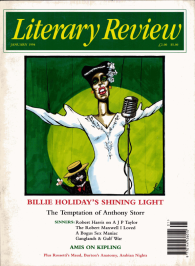Martyn Halcrow
A Taxi Driver Writes
I read in Cab Driver magazine that the Public Carriage Office has issued a warning that a number of fulcrum pins, which are fitted to the front suspension of cabs, have recently fractured. ‘Such failures could result in a very serious situation leading to a total loss of control of the cab,’ says the PCO.
This is all rather understated. Anything leading to the loss of control of a cab may surely lead to the loss of control of other vehicles on the road. I spoke to an examiner at the PCO to find out whether there are any laws of motion which would prevent this happening at high speed. No, there are not.
As it happens I was recently driving back from Weymouth on the M4 and was greatly impressed by what we call the mid-range punch of the Fairway Nissan 2.7 diesel engine. I was less impressed the next day when a fulcrum pin collapsed on the front suspension of my cab, causing it to nose-dive and more or less instantly crash on to the road. Whilst waiting two hours for the AA, I pondered my good fortune in crashing on the A40 at 20 mph, rather than on the M4 at 70 mph.
Perhaps God was telling me to persevere with this column. Perhaps He was giving me some copy. Thus I allowed myself to maunder, waiting on a cement box under the Edgware Road flyover, until I remembered an article written in the Literary Review by Jane O’Grady, the distinguished philosopher. O’Grady has no time for these appeals to Providence. They are childish and narcissistic, she says. They fail to explain why Providence should be exercised on one’s own behalf rather than on that of a thousand other people. I could not argue with this but anyway had no wish to do so as the AA arrived and it was time to forget the two-hour wait and feel grateful for small mercies. The cab was towed to Bethnal Green, where we left it for the weekend outside the garage I use. It did not escape my notice that the garage was closed when I had been working.
On the Monday I went to pick up my cab. It had been broken into, and the radio stolen. I have to say that I was not greatly upset by this development. An obvious explanation for my equanimity would be the fact that my radio was insured (although it no longer is, underwriters having decided that car-radio theft in London is so popular that they cannot make a profit from it). At the risk of sounding melodramatic, I would guess that I was quite unfazed by the stolen radio because I had recently survived a near-death experience. Even at twenty miles an hour, a collapsing fulcrum pin brings one uncomfortably close to the nitty-gritty.
I think my experience may be of use to this government, indeed to any government. As the wholesale expropriation of property by the underclass continues unabated, there will be increasingly mutinous voices of discontent from fat cats such as myself. If the government could make available – free at the point of use – a wide variety of near-death experiences to those of us who have been robbed, then I think we may look forward to a golden age of peace and harmony between the classes. The alternative is too awful to contemplate.

Sign Up to our newsletter
Receive free articles, highlights from the archive, news, details of prizes, and much more.@Lit_Review
Follow Literary Review on Twitter
Twitter Feed
It wasn’t until 1825 that Pepys’s diary became available for the first time. How it was eventually decrypted and published is a story of subterfuge and duplicity.
Kate Loveman tells the tale.
Kate Loveman - Publishing Pepys
Kate Loveman: Publishing Pepys
literaryreview.co.uk
Arthur Christopher Benson was a pillar of the Edwardian establishment. He was supremely well connected. As his newly published diaries reveal, he was also riotously indiscreet.
Piers Brendon compares Benson’s journals to others from the 20th century.
Piers Brendon - Land of Dopes & Tories
Piers Brendon: Land of Dopes & Tories - The Benson Diaries: Selections from the Diary of Arthur Christopher Benson by Eamon Duffy & Ronald Hyam (edd)
literaryreview.co.uk
Of the siblings Gwen and Augustus John, it is Augustus who has commanded most attention from collectors and connoisseurs.
Was he really the finer artist, asks Tanya Harrod, or is it time Gwen emerged from her brother’s shadow?
Tanya Harrod - Cut from the Same Canvas
Tanya Harrod: Cut from the Same Canvas - Artists, Siblings, Visionaries: The Lives and Loves of Gwen and Augustus John by Judith Mackrell
literaryreview.co.uk